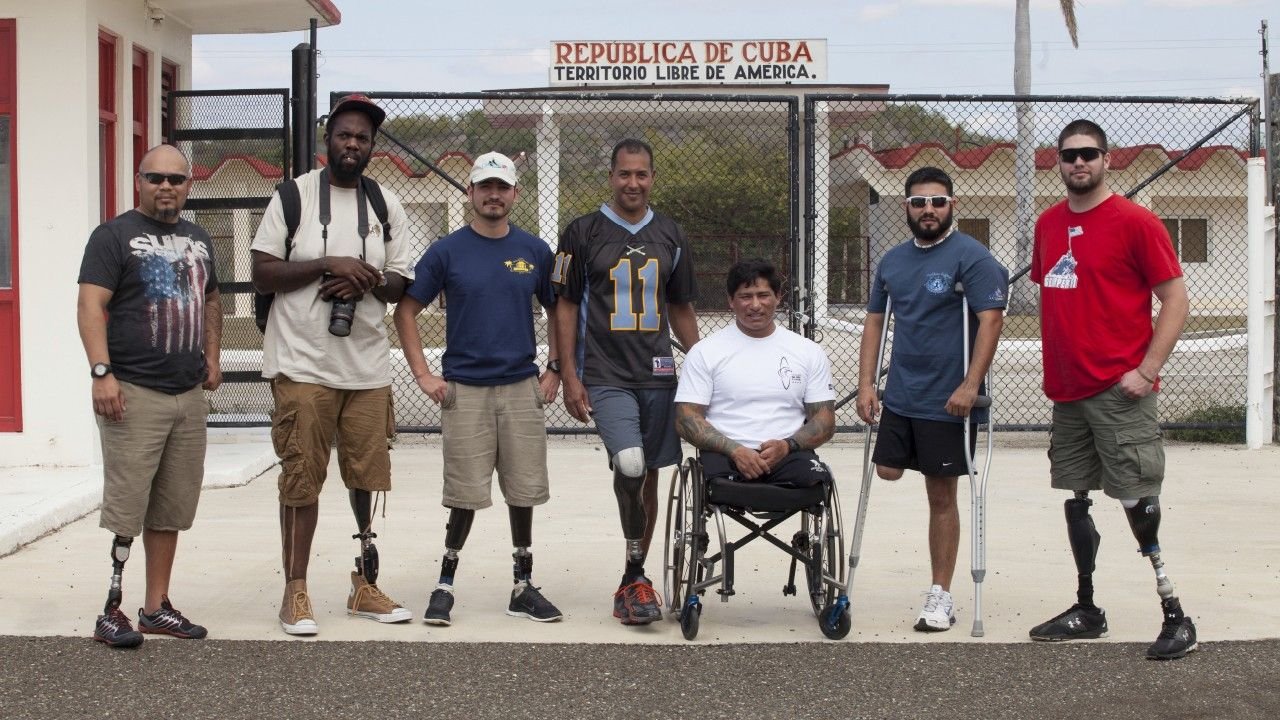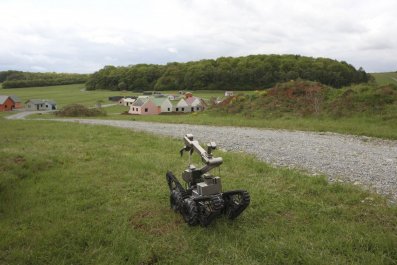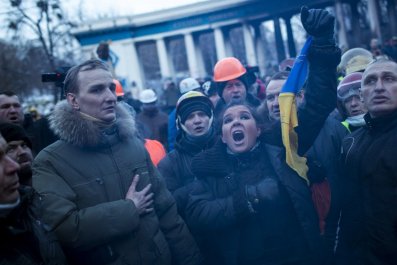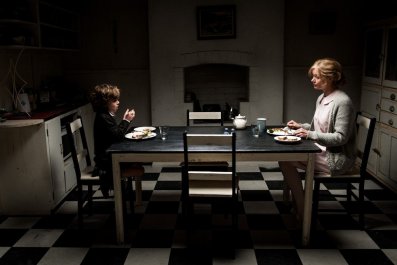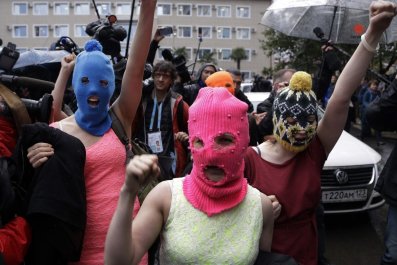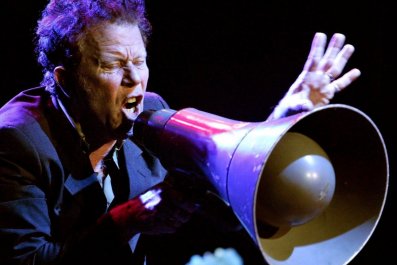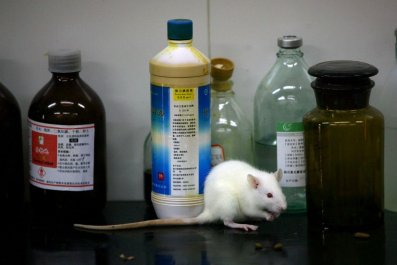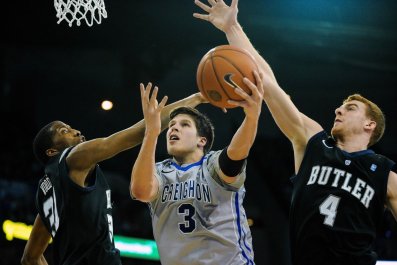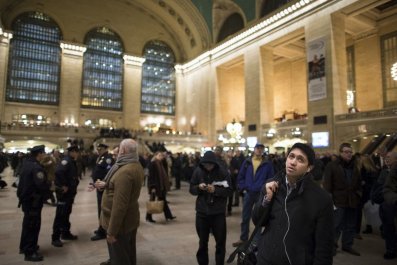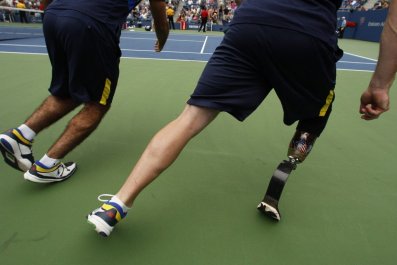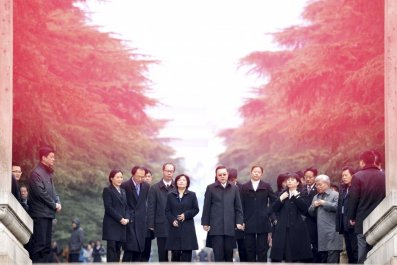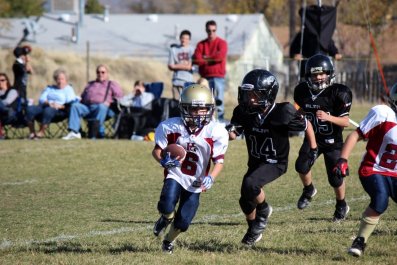At about 3 a.m. on March 1, 2003, Pakistani intelligence agents rushed into a house at 18a Nisar Road in Rawalpindi, a city near Islamabad. Inside the residence, which belonged to an aging microbiologist, they found the sleeping form of Khalid Shaikh Mohammed, who is alleged to have planned the 9/11 attacks. Pakistan's Inter-Services Intelligence handed him to the Central Intelligence Agency, which took him to a covert prison in Poland, where he was waterboarded 183 times. Then, in 2006, Mohammed was moved to the Guantánamo Bay Naval Base in Cuba, where he faces trial before an American military tribunal. If convicted, he and four other alleged 9/11 conspirators will probably face the death penalty.
Last month, Marine Corporal Eric Morante was also at the Guantánamo Bay Naval Base. Unlike Mohammed, Morante came of his own volition, to scuba dive in these pristine waters off southeastern Cuba, where lionfish dart between forests of coral and the water is nearly always the color of unadulterated sky. In a roundabout way, both men were brought here by the same global forces, that same War on Terror we've been fighting for more than a decade now.
On April 20, 2007, Morante was with Fox Company of 2nd Battalion, 7th Marines, guarding a bridge in Saqlawiya, Iraq, near the infernal city of Fallujah. A suicide bomber snuck under the span and blew up a 3,000 pound cache of explosives. Nobody died, but Morante lost his right leg above the knee. Then came a procession of hospitals: Landstuhl, Walter Reed, Brooke. The Dallas Morning News wrote a story about him, accompanied by photographs that depicted the bloodied, tear-streaked face of someone other than the quietly optimistic 29-year-old I met in Cuba, the one who wants to run his own food truck in San Antonio.
Mohammed is here with 154 other detainees, some of whom will remain at Gitmo indefinitely, since the American government can't figure out what to do with them. Some have been shipped to countries like Slovakia and the Maldives. Most have not been charged with a crime, nor ever will be. They are stranded in a Caribbean purgatory, separated from open water by barbed wire, which is almost a native species of flora here.
For Morante, that same open water is a paradise so warm and serene, he might think he was back in the maternal womb. He is here with six other veterans of Iraq and Afghanistan. Three lost both legs, four lost just one. A former Marine combat photographer named Jorge Ortiz has a left hand whose fingers look like they have melted off in the pitiless tropical sun. Carlos Torres, also a double amputee, has a scar on his back from where doctors took muscle to save his right knee. Robert "Sam" Samuel wears a prosthetic leg decorated with the Haitian flag. Michael "Iron Mike" Martinez, 23, sports a T-shirt that says, "Embrace Violence" and says that he likes the lax gun laws of Virginia, where he now lives. Orlando Gill worries about his mother in the South Bronx, where in late January 2014 the temperature is about 100 degrees lower than it is here in Cuba. On his thigh, several inches above the stump of his right leg, Gill has a tattoo that says, "Do Not Cut Above Line."
These men have come to Cuba for a week. Most of them had never been out of the United States before enlisting. Then they deployed and went so deep in-country that they left a leg or two behind in Anbar or Kunar. Now they have come to a forbidden Communist country where American tourists are limited to celebrities (Jay Z and Beyoncé, Leonardo DiCaprio) and senescent lefties wandering the byways of Havana and dreaming of la revolución mundial. And they have come to scuba, which is a sport but also a luxurious hobby for those who don't object to spending $8,500 on a Hollis Prism 2 TEK Rebreather. To earn this luxury, the seven veterans now in Guantánamo Bay had to come pretty close to death. Which they did, many times over. So here they are, diving instead of dying.
"Liberating is an understatement," says Samuel after a day of diving during which he chased fish with his camera like a determined paparazzi. Down here, free of gravity and graced with silence, Samuel has finally found what we told him he went to Afghanistan and Iraq to defend: freedom.
"You don't think about nothing that's above water," he says. "It's like a dream."
I Thoroughly Washed Away Thy Blood
The seven amputees, who are all experienced divers by now, are here with three instructors from Soldiers Undertaking Disabled Scuba (SUDS), which since 2007 has been taking groups of amputated veterans to dive at places like Rincón, Puerto Rico; Panama City, Florida; San Diego and Curaçao. The annual SUDS trip to Gitmo - the one just concluded was the ninth - is especially significant because, as founder John Thompson explains, "the bad guys are here." He does not mean the impoverished Cubans on the other side of the barbed-wire fence that stretches for 17 miles along the bay.
Thompson is 48 and divorced and looks like a paunchy sibling of Matthew McConaughey. A silver crucifix nestles in the hair of his chest. The Oklahoma native cannot, as far as I could tell, perform miracles on the order of Jesus strolling across the Sea of Galilee, but he has devoted his life to a water-walking of sorts. By teaching the amputees to dive, he wants to erase the encumbrance of using a prosthetic, to endow them if only temporarily with the range of movement they will never have again and, in doing so, remind them that they are more than just mangled flesh.
"The program is not all about diving," he says. "It's like a catalyst. It can help them segue into other things.... Maybe there's job I didn't think I could qualify for, but now I feel more confident and I'm gonna go for it." Many of the amputees dive without their legs, and when they are lowered into the water by the volunteers who crowd around them, the scene takes on the quality of an especially intense baptism: Then washed I thee with water; yea, I thoroughly washed away thy blood from thee.
Thompson and I sit talking on a rock outcropping above Blue Beach, which is usually reserved for the pleasure of senior officers, though it is no less rocky or more luxurious than any of the other eight beaches of Guantánamo Bay. In the sand below, at least two dozen volunteers await the return of the SUDS divers under the shade of a camouflage tent that imparts the feel of a military encampment, a shadow of Omaha Beach or Da Nang. The divers are under for about an hour, though a few dives last longer. The amputated vets move smoothly through the water, many of them swimming without their prosthetics, which they leave on shore. On land, the amputees find it hard to navigate the rocky terrain of the beach or the narrow confines of the pontoon boat from which they sometimes dove. Not so below.
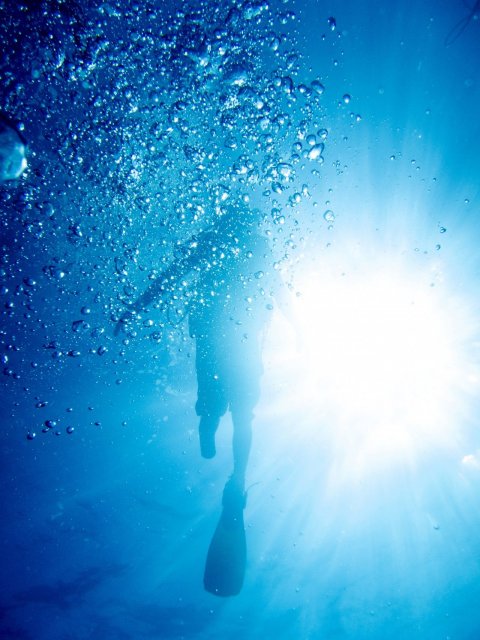
"I can do flips, I can do anything. I can go upside down, I can do handstands," Morante says. "I feel like I am not handicapped... I feel completely, fully able-bodied."
When the veterans surface, clad in black wetsuits, trailed by volunteers who brandish spearguns and knives on ankle holsters, they resemble a fighting unit taking a beachhead, a sort of Normandy in miniature. The veterans who have chosen to dive without their prosthetic legs have to be lifted out of the water. Only in that moment of emergence, when they are hoisted beneath the armpits, do the veterans reveal how helpless they might otherwise be.
Thompson presides over all this like some combination of parent, teacher and drill instructor. He grew up in the town of Sallisaw, Okla., at the foot of the Ozark Mountains, with a father who headed the Oklahoma Democratic Party and died when Thompson was 13. Thompson fils shifted right, and quite far so: on the first night we met, he ran off a number of right-wing websites he reads, which may have been intended as a warning to stay away from politics. If so, that proved immaterial, because in the week I spent with him, I never heard Thompson talk about anything but diving.
Thompson joined the U.S. Army National Guard in 1985, at 19, because, he tells me, "I needed a little direction in my life. I was kind of a wild one when I was younger." Thompson never deployed during his "unremarkable military career," a revelation he makes with regret. He attended Colorado State University, where he first learned to dive. After graduating in 1990, he spent several years leading Outward Bound trips through the mountains of Colorado, then became a dive instructor in 1997, eventually settling in Puerto Rico. There he met his wife, who was working as an Army pathologist at the Roosevelt Roads Naval Station in Ceiba.
Thompson first came to Guantánamo Bay when his wife was deployed there in 2003. From there, they went to Walter Reed, in Washington, D.C., which was then on the cusp of infamy (and, subsequently, reform). Few Americans were aware at the time of how poorly veterans were being treated there. That changed in the winter of 2007, when The Washington Post ran an exposé of the conditions at Walter Reed. One of the articles in its series ran with the headline "Soldiers Face Neglect, Frustration at Army's Top Medical Facility."
Thompson says he went to have lunch with his wife one day at the hospital and was struck by the sight of "some pretty injured guys. It was a real gut-check for me." He knew he wanted to help them, but didn't know what he had to offer, having few marketable skills other than diving and climbing. The Red Cross placed him as a volunteer in the aquatic rehabilitation program, which he promptly turned into a scuba class. He says he found the injured vets easy to work with, willing to take orders and unafraid of the water: "They've been blown up. Scuba diving's not gonna scare 'em."
SUDS is a good, small thing that cannot, alone, solve the manifold problems of those who return from war (Thompson estimates that he has worked with about 400 veterans). But others are following Thompson's lead. Melvin Pasley founded Disabled Veterans SCUBA Project, which operates out of Southern California, in 2009. He had recently returned from Iraq, where he helped train that nation's security forces, and decided to start a diving nonprofit after reading about SUDS. Pasley explains that scuba diving provides a "peaceful happy place" for veterans, as well as "a sense of being equal to everyone else." But he also acknowledges that scuba gives veterans a shot of adrenaline, a hormone to which he surmises they are "addicted."
"After living for a year in Iraq, with daily rocket and/or mortar attacks, your body gets used to having it," Pasley told me. "Scuba provides a small dose."
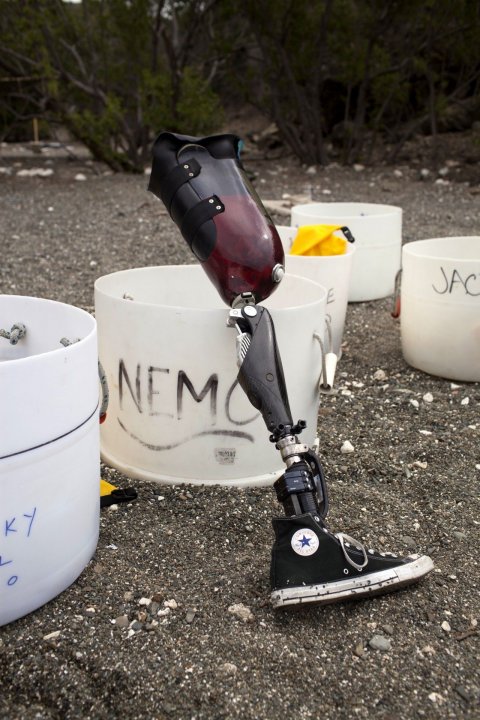
"He'd Slap Me If He Knew... "
Though used freely as both a noun and verb today, scuba is an acronym that stands for Self-Contained Underwater Breathing Apparatus. In 1942, émile Gagnan and Jacques Cousteau invented the Aqua-Lung, the prototype of today's scuba gear, delivering compressed oxygen from a tank on the diver's back through a regulator inserted into the mouth. At the same time, the U.S. Navy was deploying Underwater Demolition Teams along the coast of France and in the Pacific; the exploits of American military divers would receive the Hollywood treatment with 1951's The Frogmen. Two years later, Cousteau published The Silent World. The accompanying documentary won an Academy Award in 1956, and the YMCA began offering scuba classes in 1959. And yet, for all that, the National Oceanic and Atmospheric Administration estimates that we have explored only 5 percent of the world's waters. The oceanographer Paul Snelgrove has said that we know more about Mars than we do about the ocean floor.
Scuba for veterans without limbs ("wounded warriors") is a recent innovation. Advents in emergency medicine have allowed us to save a greater number of those wounded on the battlefield, which probably accounts for the low number of casualties from Iraq and Afghanistan (6,796) relative to the number of wounded who have returned from both wars (51,828). Yet the proliferation of crude bombs planted by insurgents has left hundreds of service members without arms or legs. In late 2012, as both conflicts were more or less concluded, an analysis of battlefield injuries found that 1,572 veterans had undergone "major limb amputations," with 83 percent having lost either one or two legs "mostly from the blast of improvised explosive devices." Five have survived as quadruple amputees. The Department of Veterans Affairs fits (and trains) the wounded with prosthetics, which have become increasingly sophisticated. That success only feeds the hunger of wounded veterans for the normalcy they have been promised. The young men on the SUDS trip have been able to box, run, climb mountains, snowboard and ski, all activities that would have been unthinkable to veterans of previous conflicts.
But scuba, unlike, say, wheelchair basketball, makes no concessions to missing limbs. Instead, it simply obviates the need for them, making it the only activity in which an amputee without prosthetics can have the same mobility (and challenges) as an able-bodied person.
Scott Taylor, who runs the A-1 Scuba & Travel Aquatics Center, a dive shop in Denver certified by the Professional Association of Diving Instructors, says that "down there," the lack of legs is not an encumbrance, especially since a proper scuba kick (a.k.a., the frog kick) is difficult to master for many new divers anyway. He recalls a veteran named Jesse, with two legs amputated above the knee, who performed "all sorts of acrobatics" underwater.
"He'd slap me if he knew I'd used 'acrobatics' and his name in the same sentence," Taylor jokes.
There are more subtle benefits, too, which did not come into focus until the end of the week. On land, these veterans stand out. People stare at them. People thank them for their service. They enter our storyline for the two wars our nation recently fought: as heroes defending freedom, as soldiers of an imperial army doing the bidding of corporate masters. As they pass through the airport, limping, they will fill fit neatly into whatever political views you espouse.
All those stories dissolve in the water off the Cuban coast, which never seems to dip below 80 degrees. The soldiers may lack legs, but so do most creatures down here. They do somersaults, chase fish with cameras into coral nooks, repose on the floor of the ocean, float, swim with their hands or capsule-like propulsion devices. The water imparts grace, hides scars, renders silent all but the sound of your own laboring lungs. It is, as one of Thompson's fellow instructors told me, "the great equalizer."
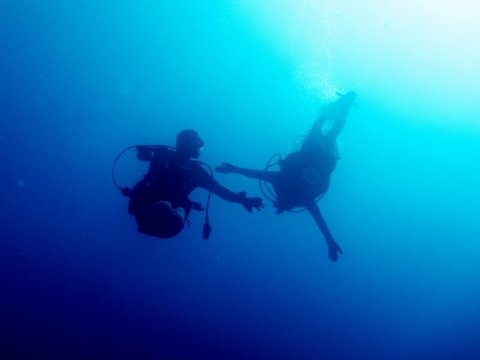
"Is This Ever Gonna End?"
Samuel, 33, sports a cornucopia of gold teeth, as well as an ever-present Miami Heat baseball cap that recalls the city where he spent his youth. He joined the Army because he wanted to travel. There was also "the patriotic thing." He was 21 when he enlisted, shipped off to basic training at Fort Benning, Ga., in 2002. Then Hawaii with the 25th Infantry Division, which was "pretty cool." Then, less cool: Afghanistan, followed by Iraq. In 2009, Samuel deployed to Afghanistan for the second time. He was on a patrol through the Arghandab River Valley when his Stryker vehicle was hit by an IED.
"It seemed like it was a joke," Samuel says of the blast that maimed him. It wasn't. He was pulled from his vehicle, medivaced to Kandahar Airfield and then to Landstuhl Regional Medical Center in Germany, a familiar journey of corporeal pain. At Walter Reed he was reunited with his mother, from whom he had concealed that he had signed up for a third deployment: he had told her he'd been given a desk job. Now she knew. He spent a year rehabilitating from scars both visible and not.
Samuel is forthright about the mental trauma of losing a limb. "I didn't feel whole," he says. "I was down and out. The depression was high... I felt useless." Not only was a leg lost, but an arm was broken. "Going to therapy to learn how to pick up a cup again, it was like, 'Are you kidding me? Is this ever gonna end? ... I felt like there was no hope."
But it did end. Samuel discovered SUDS as he was transferring from Walter Reed to Brooke Army Medical Center in San Antonio. When first approached by SUDS, Samuel found the group's premise ridiculous. "I didn't believe it was real," he says. "Like, an amputee could really scuba dive?"
He can indeed, first in the pool, then in the open water, progressing to ever greater depths. On this trip, Samuel earned a certificate in underwater photography, "Being able to take pictures underwater...I get to combine the two things that I love to do the most, which is photography and diving," Samuel says. On land, he may have to kneel to get the shot he wants, which can be tough with a prosthetic. In the water, "I can literally just lay down."
One night, during a SUDS party at the Goat Locker - the chief petty officers' club on Marine Hill - he leaned over the patio to take pictures of the banana rats that rule the night here, rodential insurgents darting in and out of the shrubbery. Two nights later, at a barbecue on Cable Beach, Samuel sat in front of a bonfire and removed his leg to glam up for the camera, hugging the appendage as if it were his lover.
"There's Legs Everywhere!"
The arrival of SUDS provided a welcome break for the base where the prevailing speed limit is 25 mph, the temperature is 90 by noon and life is generally slow. SUDS's annual trip signals a rare event at Guantánamo Bay: good publicity. Fund-raising on base raises several thousand dollars for the trip, including from contractor Burns and Roe, whose logo is prevalent at Guantánamo. Officials on base were as eager for me to cover SUDS as they were reluctant for me to get anywhere near the detention camps.
The kindness towards SUDS could be excessive. Sometimes, so many people were taking pictures of the amputees that the scene took on the uncomfortable feel of a carnival exhibition. Leaving lunch one afternoon, I heard the commander of the naval station, the disarmingly affable Captain John R. Nettleton, confide in a public affairs officer that, when the SUDS crew came to his house that evening, he was going to let them play poker and video games. "They're getting tired of the red-carpet treatment," Nettleton noted. "They wanna be normal." But the red-carpet treatment continued. Up on Marine Hill, the SUDS veterans were greeted by a scrum of grunts so young that some of them looked as if they'd stolen their fathers' fatigues. The Marines gathered like curious suitors around the amputees, who may have served as either inspiration or warning, or both.
"There's legs everywhere!" someone joked one day while the veterans were diving and their prosthetics reposed on a pontoon boat. Sometimes, in the high heat of the afternoon, when the volunteers broke out bad beer and potato chips and the amputees lay down to rest, we slipped into a spring-break lassitude. I remembered, then, how Thompson had likened Guantánamo Bay to South Florida the first time I spoke to him. When the Bud Light appeared, this really did seem true.
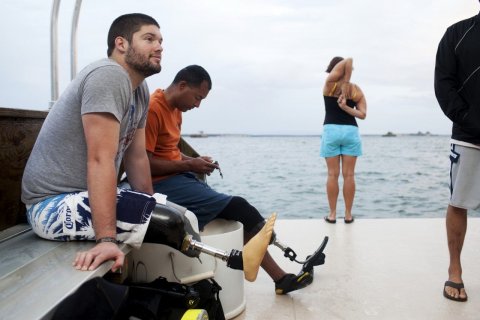
Some of the amputees handled the endless attention, the unrelenting gratitude, with good cheer. Foremost among them was Antonio "Fast Tony" Cruz, a preternaturally upbeat native of Puerto Rico who said he was 44 but had none of the weariness one finds in creeping middle age. His body was lean, with a total lack of self-pity for his missing right leg. Cruz deployed with the 82nd Airborne Division to Khost Province in Afghanistan, then, in 2003, deployed to Iraq, where he was stationed in Fallujah, which his unit left right before Operation Vigilant Resolve, the Marines' costly effort to "pacify that city," as one officer put it. He was injured on his third deployment, in Afghanistan, at Combat Outpost Zerok in mountainous Paktika Province, when a mortar round "bulls-eyed" on his ankle. The mortar did not explode; if it had, Cruz is convinced he "would've been ground beef." So that worked out for him, in a way.
"I'm good with it," he says of his injury, which he discusses as if it were a shallow nick of the knife. "You regroup, reorganize and continue mission. And that's what I did." He is now moving to Panama City - a scuba haven on the Gulf Coast near Tallahassee - where he will finish college and hopefully become a radiology technician. He will also pursue wreck diving, speaking longingly of a trip to the coast of Africa. It is a sad irony that disfiguring injury has given these veterans, many of whom come from broken homes and/or poverty, the opportunity to travel so far beyond the bounds of the small towns and urban ghettoes where they might have otherwise been confined.
Cruz and Gill, the South Bronx native, were the voluble jokers of the group. Cruz pretended to drink a beer out of his leg one night (or maybe he did). He says that when he was injured, his first instinct was to check if his reproductive organs were intact. It appears that they were; during an interview on Radio GTMO, Nettleton, the naval station commander, asked Gill if he was single. Gill isn't, but Cruz volunteered that not only is he available to date but "taking applications." Later in the week, during a tour of the Northeast Gate - the closed passageway to Cuba, and the base's version of Berlin's infamous Checkpoint Charlie - Gill had me take pictures of him attempting to scale the fence to Castro's Communist paradise.
At the other end of the spectrum was Ortiz, who sustained the most serious injuries in the group. Thompson had warned me that Ortiz was reluctant to talk because he was "still working through some issues." He seemed unapproachable from the start, a powerful torso astride a wheelchair, a wince always on his lips. A reporter for one of the base's two newspapers went up to Ortiz while he reposed under the tent at Blue Beach. His responses to her were perfunctory; eventually he simply said that he preferred not to answer at length. Sometimes, his body seemed too tired to either dive or do much of anything but rest without movement. One afternoon he expressed enthusiasm for shooting an iguana up on Marine Hill, which would have been against base regulations and subject to a sizeable fine. Most of the time, he was simply silent.
Contrary to my expectations, none of the veterans seemed to give much thought to the 155 detainees held here. Other than a stray waterboarding joke, everyone seemed studiously uninterested in the many things this place means to many people around the world. "Honestly, I just don't think about that," says Carlos Nettleton, 24, who lost both of his legs in Afghanistan's Helmand Province in 2011. Cruz put it more bluntly: "I'm here, they're here. They earned their own trip to Cuba." I had expected some triumphalism. There was none. There were still soldiers, coolly rational about the wars they had fought, the injuries they sustained, the men in the detention camps. They were here to scuba dive, they told me time and again. At first, this had seemed like evasion, as if they were hiding from me what they really thought. Only later did it occur to me that I am here to scuba dive was what they really thought.
"You're Home Now"
At a welcome center for families, you can pick up a copy of Coming Home, a comic book about the pressures soldiers face in returning to civilian life. In the first frame of the first story, Sergeant Jason Fetterman is shown sleeping on the floor with a baseball bat next to his pillow, his wife in bed alone. Freaked out by a sound, he prepares for an attack, crouching with a bat behind a curtain. Now his wife is freaked out, too: "You're going to wake up my parents!" Fetterman goes to smoke a cigarette.
"Chill," he tells himself. "You're home now. Just chill. This isn't Ramadi."
Thompson does not appear to have any delusions about the benefit of scuba diving to men and women whose lives may have been daunting enough before they were ever injured. SUDS is in a constellation of non-for-profits that are desperate to make sure that the veterans of the unpopular wars in Afghanistan and Iraq are treated better than those who returned 40 years ago from the unpopular war in Vietnam. Hero Dogs, Inc. provides service dogs to veterans; The Soldiers Project offers mental health counseling; the Veterans Writing Workshop formalizes the long-standing tradition of dealing with the trauma of combat by writing about it.
But turning the care of veterans over to entrepreneurial do-gooders can also create problems. Take, for example, the omnipresent logo of the Wounded Warrior Project, with its evocative image of a soldier carrying an injured comrade over his shoulder. I saw that logo everywhere in Guantánamo Bay; I see it everywhere stateside. The organization's mission seems to be unimpeachable, yet in its sweeping investigation of American not-for-profit organizations, the Tampa Bay Times found that the project spends only 58 percent of its donations on services for veterans, while paying its chief executive officer, Steve Nardizzi, an annual salary of $330,000.
In 2012, CNN reported that the Disabled Veterans National Foundation had garnered almost $60 million in funding since 2007, yet "almost none of that money has wound up in the hands of American veterans." That organization was awarded a grade of F by CharityWatch, which monitors not-for-profits. And last December, John Donald Cody was sentenced to 28 years in prison for pretending to raise money for his "charity," the U.S. Navy Veterans Association, then trying to keep the $100 million he collected from well-meaning Americans.
For the first time in the 21st century, the nation is figuring out how to accommodate thousands of men and women returning from war. Before I came to Guantánamo Bay, I had lunch with Phil Klay, who served in Iraq and is about to publish a book of short stories, Redeployment, about soldiers in combat and after it. When I asked him for advice on how to approach veterans with severe injuries, he cautioned me not to treat them "like damaged goods." That was very hard with men like Ortiz, on whom damage hung like a second skin. It was much easier with someone like Martinez who also lost both legs in Afghanistan, though only one above the knee. He is from Prescott, Ariz., the son of a Vietnam War veteran. He knew he wanted to be a Marine from the age of 7. He lives with the same service dog, Hank, with whom he served in Afghanistan. He is in school, studying criminal justice. He is fine.
The resilience of veterans like Martinez can't be ascribed to any one program, but, rather, to a support-our-troops mentality that, even a cynic has to admit, is more than just bumper-sticker patriotism. The organization Homes for our Troops built Martinez a house in Purcellville, Va. That doesn't solve everything; nothing solves everything. But today's veterans have it better than Ernest Hemingway's World War I veteran Harold Krebs, who in the story "Soldier's Home" returns to Kansas from the battlefields of Belleau Wood and the Argonne Forest to find that his "town had heard too many atrocity stories to be thrilled by actualities."
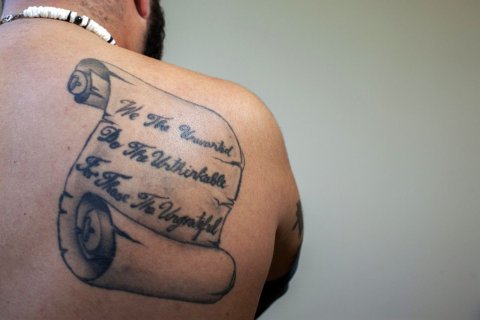
Being Chased
Morante has a tattoo on his back: "We the unwanted do the unthinkable for those the ungrateful." This is a grim view of military life, but plenty of soldiers share it. When Morante talks about the tattoo today, he does with the awareness that he is no longer the young man who had those words inked on his skin. Many years have passed since then, along with a lifetime or two.
He says the months following his injury were plagued by nightmares of combat, of being chased. Learning to use a wheelchair was immensely frustrating. And then there were the invisible wounds. "I was on all this medication," he says. Now, too, he is talking about an outdated version of himself, the version that sat in his room all day, watching movies and taking pills, waking up each morning with a pharmaceutical hangover. "I'd turned into a zombie."
Then he stopped taking the pills, which might have killed him. Instead, it saved him. Now, he boxes and cycles, plays volleyball and softball. He also has a catering business and is in culinary school.
He estimates that he has been on five SUDS trips. His air conservation is better; he was able to stay underwater for over an hour during one dive at Guantánamo Bay. Down there, he likes to "think without interruption," though worries of sharks do sometimes intrude. These are minor, however. He is neither predator nor prey, but just another harmless creature of the fathomless blue.
"I feel like I am complete again."
He has, finally, come up for air.



